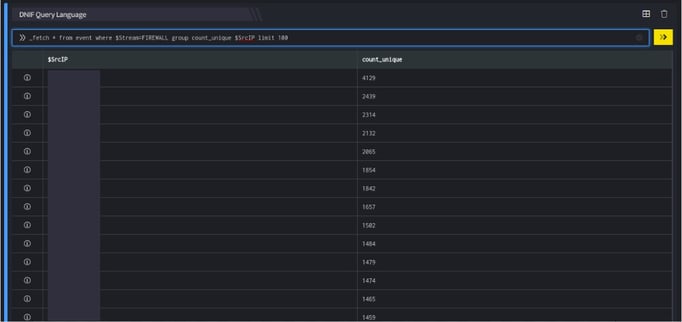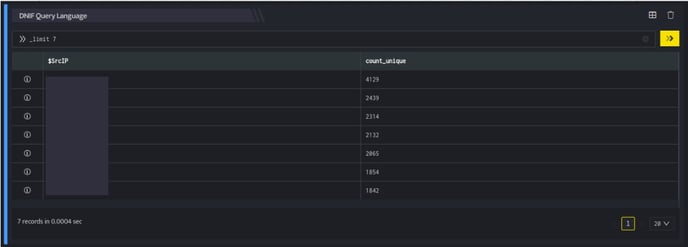- KNOWLEDGE BASE
- DNIF Query Language (DQL Language)
- DQL (LEGACY)
-
START YOUR TRIAL
-
DEVICE INTEGRATION
-
CONNECTORS
-
DATA INGESTION
-
HUNTING WITH WORKBOOKS
-
DNIF Query Language (DQL Language)
-
SECURITY MONITORING
-
OPERATIONS
-
MANAGE DASHBOARDS
-
MANAGE REPORTS
-
USER MANAGEMENT & ACCESS CONTROL
-
BILLING
-
MANAGING YOUR COMPONENTS
-
GETTING STARTED
-
INSTALLATION
-
SOLUTION DESIGN
-
AUTOMATION
-
TROUBLESHOOTING AND DEBUGGING
-
LICENSE MANAGEMENT
-
RELEASE NOTES
-
API
-
POLICIES
-
SECURITY BULLETINS
-
BEST PRACTICES
-
DNIF AI
-
DNIF LEGAL AND SECURITY COMPLIANCE
_limit
_limit is a query directive used to limit the number of rows in a result set to the integer value specified in the query function. _limit always picks (includes) rows from the top of the result set of the previous query function in the pipeline.
Syntax
The generic syntax of the _limit directive is as given below:
_limit <integer>
Example
Take a look at the example given below:
_fetch * from event where $Stream=FIREWALL group count_unique $SrcIP limit 100
>>_limit 7
Here:
The _fetch directive retrieves all fields for each event where $Stream is FIREWALL. The result set is grouped by unique values of $SrcIP along with a count (count_unique) for each group. The result set is sorted in the descending order of count_unique (by default). It is then limited to 100 rows. The output is as shown below:

In the pipelined query function, the _limit directive limits the result set to the first 7 rows (from the top of the result set). The output is as shown below:

